It’s 1974—the year that Nixon resigned, ABBA won Eurovision (down in sunny old Brighton, no less), and an English teacher called Mr King published his first novel, entitled Carrie. Now, join me as we talk about none of those things.
IMDB Top Ten (by popularity) (link)
- The Texas Chain Saw Massacre
- The Godfather: Part II
- Young Frankenstein
- Blazing Saddles
- Emmanuelle
- Alice Doesn’t Live Here Anymore
- The Conversation
- Chinatown
- Murder On The Orient Express
- The Man With The Golden Gun
US & Canada Box Office Top Ten (link)
- Blazing Saddles
- The Towering Inferno
- The Trial Of Billy Jack
- Young Frankenstein
- Earthquake
- The Godfather: Part II
- Airport 1975
- The Life and Times of Grizzly Adams
- The Longest Yard
- Murder On The Orient Express
We’re not even halfway through the seventies and we can already see one of the genres that defined the decade peaking, as well as Mel Brooks more or less single-handedly elevating the satire to blockbuster status. Not only that but we get a number of titles that could comfortably wear the title of Best Film Ever in their respective genres. It might not be my personal best year ever for cinema but it could be a pretty strong contender.
So, without any more waffle … what’s good? What’s not? What’s unseen? What’s missing? Read on!
The Texas Chain Saw Massacre
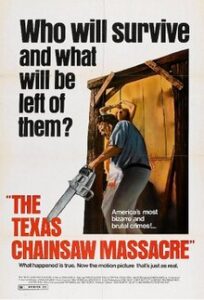
Without The Texas Chainsaw Massacre, we possibly would not have Alien (at least not the version we got—the horror in that movie came right from the impact this one had on director Ridley Scott). There probably wouldn’t be a whole bunch of other films either. The 1970s is undoubtedly the decade that spawned the slasher movie (which film actually got there first is a little contentious) but The Texas Chainsaw Massacre was the movie that delivered the horror genre an unrelenting, gory, terrifying rebirth that audiences were barely prepared for and opened the doors for what came next.
I saw this at University. It wasn’t my first time seeing the movie but it’s the one I remember best. Having been brought up on eighties horror, it was hard for me—at first—to appreciate the old school masters: there was little of the fun of Freddy Krueger; none of the out-there-ness of Hellraiser. Not even a pre-credits sting: just a gradual build-up. Consequently, whenever it was that I first saw The Texas Chainsaw Massacre it didn’t make much of an impression. That time at University, though … when Leatherface makes his first appearance? Holy shit! A moment that is forever seared into my brain.
This is not a film that sits on my goto rewatch list of horror classics. I don’t think I’ve even ever owned a copy on any home video format. It’s certainly a film I admire for its guts (in both senses of the word) and for what it did for the genre.Will I watch it again sometime? You bet.
The Godfather: Part II
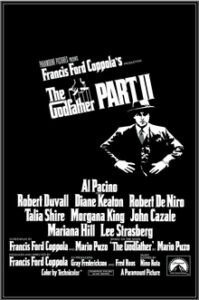
It’s a popular pub quiz conceit that this is one of those sequels that’s even better than its predecessor. Up until a few weeks ago I’d only seen this twice (at best) so I’m probably not best qualified to add my judgement. One of those early occasions was a VHS box set release called The Godfather Trilogy, which re-edited all three films into chronological order. For a while this was the only version we knew and it led to one of my all-time favourite memories. An old friend of mine, having just watched a screening of Part II on TV, phoned me in absolute outrage at the way ‘they’ had butchered the film—splicing the Robert De Niro scenes throughout the film, ruining up the Al Pacino narrative. Little did he realise that he had just watched the film the way it was supposed to be seen.
Having recently enjoyed The Godfather, my eldest son and I made a point to catch up with Part II a while back. We watched it over two sittings (the new 4k disc conveniently comes complete with the original “Intermission”) and I came away comfortably awed. Perhaps one of the greatest things about the movie is, indeed, the parallels between Vito Corleone’s rise to power, surrounded by his growing family, and Michael Corleone’s descent into cold isolation. I cannot imagine how anyone might have thought reordering this film into chronological order was remotely a good idea. I can only hope my old friend came to a similar conclusion.
The Towering Inferno
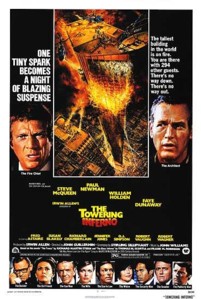
The seventies is absolutely the decade of the disaster movie, but I had no idea that three of the genre’s biggest entries all landed in the same year (meaning it’s almost certainly downhill from here). Like so many movies from this era, I was first introduced to this one on broadcast TV. I’ve seen it once or twice since then and it’s decent fun but not something I’ve particularly sought out for repeat viewings.
My favourite thing about this movie might actually be the behind the scenes dick waggling, between Paul Newman and Steve McQueen, over who would get top billing on the poster. The eventual compromise was that Paul Newman would be billed at the top of the poster, but Steve McQueen’s name would appear further to the left; a relatively smart way of having them both billed first, depending on whether you read left-to-right or top-to-bottom. It entertains me no end that you can be one of the biggest stars on the planet, but still be bombastically insecure about such things.
Earthquake
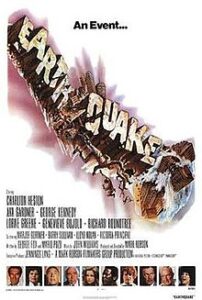
This is the ultimate slice of seventies disaster movie cheese in my book. I’ve seen this countless times and it’s always a blast. For some reason this one captured my imagination more than the others as a kid. Perhaps it’s because the scenario truly allows for an epic setup—a recognisable cast spread far and wide at the start of the movie, whose paths are eventually drawn closer in the face of big budget disaster. At the time it was probably Victoria Principal who was most familiar to me (from Dallas) and she’s nowhere near the top of the poster—sure enough, it’s Charlton Heston who’s unambiguously listed at the top. I’ve seen this a few times in more recent years and it mostly holds up, except for that scene where an elevator full of people crashes to the ground and a bizarrely animated blood splatter flies at the screen.
Airport 1975
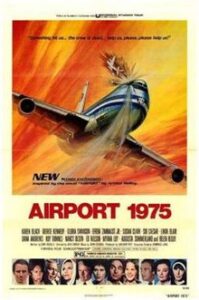
What is the state of the universe when a film clearly titled Airport 1975 comes out in 1974? Well, allow me to ruminate: back in ye olden times it was not uncommon for popular films to stay in cinemas for months on end and, given that this one was released at the tail end of 1974, it makes sense to keep the title current for the following year. It would make more sense not to date it by having a year in the title at all but I’m not the one in charge of these things.
I do love the Airport movies: the series started out back in 1970 with a relatively sedate Oscar-worthy drama and eventually gave us one of the most brilliantly terrible movies of all time with Airport 79: The Concorde (released, funnily enough, as Airport 80 in some territories). This one ticks the disaster movie boxes and manages to be quite a fun time without plumbing the depths (there’s definitely a pun intended there) that later films in the series resorted to.
Blazing Saddles
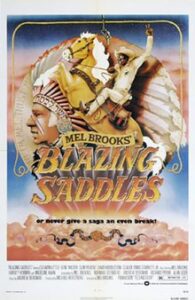
When I grew up this was a film all about beans and fart gags. I watched it again a few years back and it became a film all about racism which tackles, head on, that old question of how to present racist characters and scenarios without your film also being racist. I’m not qualified to determine how well it answers that question, but Whoopi Goldberg has an opinion on it.
Much of the comedy in Blazing Saddles is too broad for me (fart gags) but the film has so many classic moments that you have to forgive the occasional low shot or misfire. Also it has Gene Wilder, so I automatically love it. I didn’t realise that Richard Pryor was originally cast as Sheriff Bart (which makes sense given Wilder and Pryor were paired up on screen more than once. Pryor, at the time, had a reputation for a certain drug-influenced unreliability and was replaced by Cleavon Little. I do love some of Pryor’s other films but I honestly can’t imagine him in this one given the easy and memorable charm that Little brings to his performance.
Young Frankenstein

One of the things I learned while putting this post together is that Gene Wilder only agreed to do Blazing Saddles if Mel Brooks would do this film next (something of a passion project for Wilder, it seems). I have no idea how Brooks managed to produce two of the most iconic comedy films in cinema history so close to one another but we should be grateful that he did.
I’ve been meaning to rewatch this for quite some time (my Dad first introduced me to this sometime in the eighties). I’m a huge fan of the Universal Monster movies, so this should be a done deal but I guess I’m a bit worried about it falling flat for me (see my above note about broad comedy). That being said, a lot of the gags still live rent-free in my head and I have a particular fondness for the futile insistence Wilder’s character has on the appropriate pronunciation of Frankenstein.
The Conversation
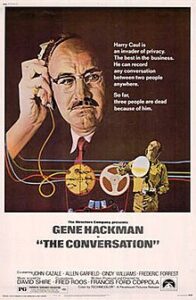
Having less than enjoyed the experience of making The Godfather, one of Francis Ford Coppola’s conditions for revisiting the Corleone family was that Paramount should also greenlit this smaller scale thriller. I watched this once in my teen years (and maybe once or twice since) but a friend and I have been making a point to explore classic seventies thrillers of late so this is a title I’ve watched fairly recently.
I may have mentioned previously that I’m a bit of a Gene Hackman fan. I also have a deep love for the specific brand of paranoia/conspiracy thriller that became especially popular in the seventies (I’m not going to bog down this post going into the historical reasons behind this phenomenon, but you can read this post if you’re interested). I came away from my most recent viewing wondering why this film hadn’t made its way into my favourites list a long time ago. It has an incredible performance from Hackman, it’s beautifully shot, it has a measured pace that never lets you get bored, and it even has a pretty good twist or two along the time. Not to mention Harrison Ford making you wonder why he didn’t get to play creepy a bit more often. An absolute classic.
Chinatown
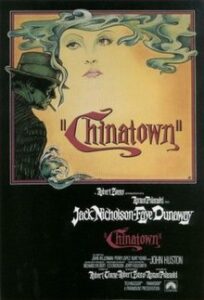
A lot of people who know about such things like to say that Chinatown is one of the best scripts ever written. I don’t feel particularly qualified to dispute that judgement. Until recently, I’d only seen this once sometime back in my twenties, and even then it was mostly because everyone said it was a classic and I figured I should watch it. It didn’t particularly land with me back then but I decided recently that I really should give it a second chance and I’m glad I did. It’s a bit leisurely in its pacing and feels a bit dated at times, but it also does a fine job of taking the classic noir detective thriller (you can easily imagine Bogart in this) and dragging it into the New Hollywood moment. You can see the elements being birthed here that so many other filmmakers have adopted for more recent noir thrillers, carrying them through into the eighties and nineties in particular. It’s intriguing that this comes a year after The Long Goodbye and at once seems much more dated while also proving so much more influential. Not to be too spoilery, but it also has one of my favourite seventies tropes: the good guys don’t win.
The Man With The Golden Gun
Is it Christopher Lee who has the “powerful weapon” that Twiggy sings about, or is it Roger Moore? Answers on a postcard please.
Unseen
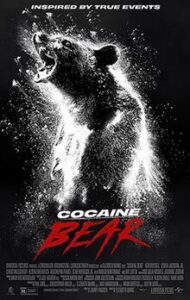
What even is The Life and Times of Grizzly Adams? I have a feeling it might star the late, great Kris Kristofferson, but the film is more amusing if I know nothing at all about it. Let’s pretend it’s about a Grizzly bear, affectionately nicknamed ‘Adams’ (perhaps because he once belonged to someone called Adam?) who has decided to give up his man-eating ways and live a civilised life in a nice little shack somewhere on the edge of the forest. Naturally, GA’s quest for a quiet life is threatened by marauding evildoers and he is forced to go on one last revenge-fuelled rampage until he finally learns there is no peace to be had for man-eating bears. There you go. I’d watch that one.
Other films I’m unlikely to watch from this year include Emmanuelle (if I was ever going to watch this it would have been about 40 years ago). That said, I’m both amused and perplexed that it’s in the IMDB top ten for this year. Does this mean it’s actually good? I saw the remake of The Longest Yard (it starred Vinnie Jones and was called The Mean Machine. I remember watching it … and not much else). Anyway, I’m not a huge fan of sports movies, so: pass.
Curiously there is one film in this list that I’ve never heard of, and it’s The Trial of Billy Jack—the sequel to a film I’d never heard of from 1971. We can probably work out the basic plot of that one.
Two films that I should check out at some point but have no immediate plans to are: Murder On The Orient Express (I watched, and thoroughly enjoyed, the recent Kenneth Branagh version) and Alice Doesn’t Live Here Anymore. Actually, the idea of a romantic comedy directed by Martin Scorsese is bizarre and compelling, and the more I read about this movie the more tempted I am to watch it.
The also noteworthy
I can’t wrap up 1974 without highlighting four additional personal favourites of mine, but first I also have to tip the hat to Black Christmas which many credit as one of the major steps in the formation of the slasher movie (eventually codified by John Carpenter). The last time I watched this one, just a few years back, I was surprised how raw and graphic it was given the year. Then again: same year as The Texas Chainsaw Massacre.
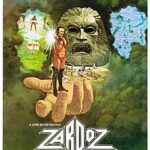
This year also brings us the truly bizarre Zardoz, starring Sean Connery in a big red mankini. I think I stumbled across this thanks to my burgeoning pre-teen interest in sci-fi cinema. Either way I remember recording it off TV late one night and watching it many, many times; never quite understanding it but always being fascinated and entranced by it.
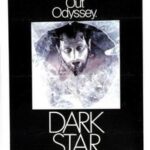
Another favourite oddity of mine from this year is Dark Star, the debut film by John Carpenter which, in its own way, ended up bringing us Alien (writer and star Dan O’Bannon was so dismayed by the critical reaction to this comedy effort that he vowed to swing in the exact opposite direction—horror—and the screenplay for Alien was the result). Like Zardoz this was another film I spent my teen years watching repeatedly. I even had the soundtrack album!
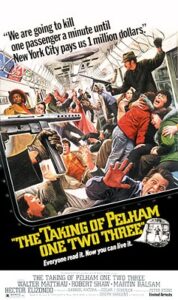
I couldn’t tell you when I first watched The Taking Of Pelham One Two Three (most likely a long time ago on TV with one or other of my parents) but it’s a film I’ve dipped into from time to time (most recently on a 4k disc that I was super excited to add to the collection) and it remains consistently delightful. Robert Shaw is terrifying; Walter Matthau is hilarious and unconventionally heroic; and Ben Stiller’s Dad is along for the ride giving a brilliantly obnoxious performance. It’s also a damn good thriller. If you haven’t seen this one yet (ignore the remake) then go ahead and treat yourself.

Finally a film that comfortably sits in my personal top ten: The Parallax View. Most people hail another Alan J Pakula film, All The President’s Men, as the pinnacle of the conspiracy thriller, but this is the one for me. I first encountered this in 1993 courtesy of the aforementioned Moviedrome series (here is Alex Cox’s intro for your viewing edification) and something about it has stuck with me ever since. Maybe it’s the superbly tense opening, maybe it’s the ending, maybe it’s the overall tone—there’s a lurking menace in the background of every single scene. My favourite scene comes midway through when Warren Beatty’s reporter, posing as a candidate for the shadowy Parallax Corporation, is shown some sort of psychological screening film. It’s a startling combination of imagery and music (what I wouldn’t give to have an official release of Michael Small’s score!) which you won’t easily leave behind. It’s possibly one of those movies that you might watch and think is perfectly ok but wonder what I’m going on about. All I can say is that it’s a confluence of several things that I love about cinema and storytelling and, for me, is one of the defining movies of seventies [American] cinema.
So … long post, some rich pickings indeed—thanks 1974! What are your highlights? Comments below …
Footnote: I looked up the plot to the Life and Times of Grizzly Adams and it does have a bear in it, so I was basically right about the whole thing. There will be no further discussion.
